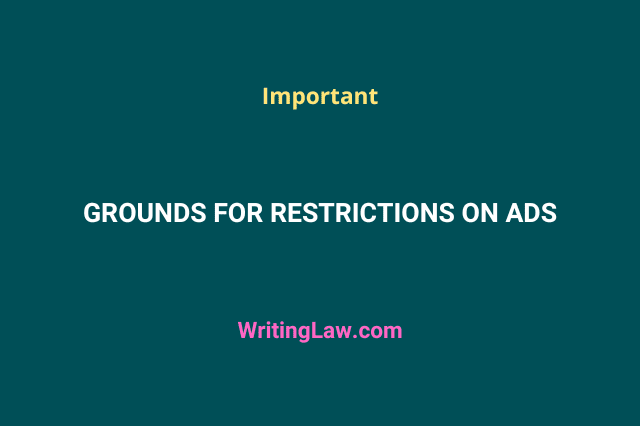
India is a democratic country, and as per the Indian Constitution, every citizen has the right to freedom of speech and expression. However, this right is subject to certain reasonable restrictions essential for maintaining public order, morality, and the integrity of the country.
Advertising plays a significant role in business operations, but it must comply with the country’s laws and regulations. In India, various restrictions can be enforced to govern advertising and ensure it is fair, ethical, and lawful.
In this article, we will explore some of the grounds for restrictions on advertisement in detail.
Meaning of Advertisement
Advertisement, or simply an ad, is a type of communication aimed at promoting or selling a product, service, or idea. It is created by businesses, organisations, or individuals to reach a specific audience and influence them to take a particular action, such as making a purchase or supporting a cause.
Advertisements can be in the form of print ads in newspapers and magazines, television and radio commercials, billboards, online ads, and more. The primary objective of advertising is to create awareness, generate interest, and ultimately drive sales or achieve a particular goal.
Four Grounds for Restrictions on Advertisement
The restrictions on advertisements are necessary to safeguard the interests of the general public, protect consumers from misleading or false claims, and maintain social and moral values.
Here are four major grounds on which restrictions can be imposed on advertisements.
1. Drugs and Magic Remedies
The Drugs and Magic Remedies (Objectionable Advertisements) Act of 1954 aims to prevent advertisers from making false or misleading claims about drugs and remedies that have magical properties. This Act is intended to protect consumers from being misled by advertisements that claim unrealistic results.
Any person found violating the provisions of the Drugs and Magic Remedies (Objectionable Advertisements) Act by publishing or distributing such objectionable advertisements is liable to imprisonment of up to 6 months, a fine of up to Rs. 1,000, or both. For subsequent offences, the punishment can include imprisonment of up to one year, a fine of up to Rs. 5,000, or both.
2. Indecent Representation of Women
The Indecent Representation of Women (Prohibition) Act of 1986 seeks to prevent the exploitation of women in the media by prohibiting the depiction of women in an indecent or derogatory manner through any means of advertisement, publication, writing, or painting.
The Indecent Representation of Women (Prohibition) Act also prohibits the sale, distribution, or circulation of any such material that depicts women in an indecent manner. The purpose of the Act is to protect the dignity of women and promote gender equality by preventing their objectification in the media.
The violation of the Indecent Representation of Women (Prohibition) Act can lead to penalties, including both fines and imprisonment. The penalty for the first offence is imprisonment for a term of up to and not more than two years and a fine of not more than 10,000 rupees. In case of a subsequent offence, the imprisonment may extend to 5 years, and a fine of up to 10,000 rupees can be imposed.
3. Prize Competition
In India, the Prize Competitions Act of 1955 governs prize competitions. According to the Act, a prize competition is any contest where prizes are awarded to participants based on their performance of skill, chance, or both.
The provisions of the Prize Competitions Act apply to prize competitions held both inside and outside India but which are advertised or promoted in India. Organisers of prize competitions must obtain a licence from the state government before conducting the competition.
The Prize Competitions Act also lays down penalties for violations of its provisions. If the competition is conducted without a licence, the organisers may be punished with a fine of up to 1,000 rupees, imprisonment for up to 3 months, or both. Furthermore, if the competition is found to have violated the Act, the prizes and entry fees collected from the participants may also be forfeited.
Although the Prize Competitions Act governs the conduct of prize competitions, advertisements promoting or marketing the competitions are also subject to regulation by the Advertising Standards Council of India and other laws.
4. Misleading Advertisements
Misleading advertisements contain false or deceptive claims about the nature, quality, or efficacy of a product or service or make false or misleading statements about the price or quantity of a product or service.
The Consumer Protection Act of 2019 was enacted to safeguard consumers’ interests and promote fair trade practices. The Act includes provisions that prohibit misleading advertisements to prevent consumers from being deceived.
The penalty for violating the provisions of the Consumer Protection Act can vary based on the nature and severity of the violation. For instance, if a person or business publishes a misleading advertisement, they may be fined up to 10 lakh rupees for the first offence and up to 50 lakh rupees for subsequent offences.
Apart from fines, the Act also provides for other penalties, such as imprisonment for a term ranging from 3 months to 2 years, cancellation of license or registration, and a ban on conducting business. The type and extent of the penalty depend on the gravity of the offence and the discretion of the authorities.
Summing up
Advertising is a crucial tool for businesses and organisations to promote their products, services, or ideas to the public. However, advertising’s impact is not limited to its commercial benefits but can also have broader social implications.
The Indian government has established various grounds for imposing advertising restrictions to ensure that it is ethical, fair, and adheres to the country’s laws and regulations. These restrictions are vital for maintaining public order, morality, and the country’s integrity while safeguarding consumers from misleading or false advertisements.
- Understanding the Legislative Branch of the Indian Government - 6th May 2024
- Appointment, Oath, and Removal of Constitutional Posts in India - 28th April 2024
- Powers of Income Tax Authorities in India - 26th April 2024







